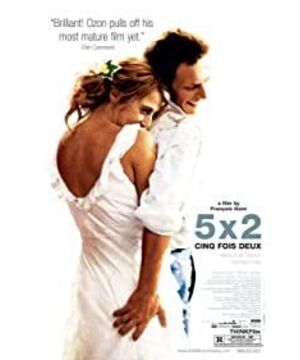Why can't our love last forever?
François Ozon's "Love Appreciation" is a grim film. The flashback technique like a scalpel provides the audience with a sharp angle to watch the death of love, and analyzes the fragility and unbearability of love. Falling in love is easy, but staying together is the hardest. The sweetness of every wedding seems to be similar, but the decisive breakup has its own bitterness. Through reincarnation and comparison, the five symbolic sections reflect the splendor of love and the cruelty of reality, which can be described as ingenious.
What is the reason for hurt feelings? Why does marriage rot so easily? You can say it is external temptation, blind impulse, growing suspicion, trivial details of life, etc. The initial passion is often worn out, and the only thing left is the tiredness of each other, and it is no longer as good to stay and depend on each other. As beautiful as the oath described, it has only become the need and inertia of life, and everything seems to be a routine. The terrifying familiarity eats away at even a shred of novelty, which is why Ferron says to his shyly covering his naked wife at the beginning of the film, "No, you think we just got married?" And this is their last effort to save the failed marriage.
As a result, in the long marriage, there is no longer the understanding when the eyes meet, and the love when the lips touch. The peaceful life tests the patience of both parties and numbs the interest in getting to know each other. Every ordinary couple seems to have walked into a labyrinth. The more they go inside, the darker they become, the more anxious they become, and the more and more they feel alienated. All the good things in the past are accelerating irreversibly.
"Love Appreciation Period" tries to understand all this from the perspective of a bystander. The film has always maintained calm and restraint, and only in this way can this elegy of love become extraordinarily pathetic. It's leading the audience to think about whether they remember who they were ecstatic about, who they were sad about, and how longing they were in difficult times, as the couple listened to the divorce settlement with a blank expression, and when they finally parted ways and became strangers. Hear a word of encouragement from the other party? Do they remember the thrill of first meeting, the high spirits at the wedding ceremony, the nervousness waiting for delivery? Only through this fragmented review can the absurdity and ruthlessness of a lonely exit be revealed, and every young couple who spend their whole lives be shocked deeply.
The pleasure of the peak was lost in an instant. We will never go back to the past. We used to want marriage to be the proof of love, but it turned out to be the grave of love. What a sarcastic black humor. Perhaps, as the last sacrifice of this love, the only thing left in each other's memory is the setting sun like blood when they met and the indifferent back after breaking up.
In the end, we still can't grow old.
PS
Recently, I was reading "On Chesil Beach" by Ian McEwan, a British writer. There are two paragraphs in it that describe the sweetness of confession when we first met and the numbness of breaking up, which can be quite referenced:
"His tone is light and joking. Like, but she decided to take his words seriously. It would be a long time before the anxiety hit her, but every now and then she wondered where she was going. They confided in each other a month ago. Love, that moment was exciting, and one night later, it made her toss and turn, and she was vaguely worried about whether she was too impulsive, whether she let go of something vital, Is it giving away something that doesn't really belong to her. But it's so interesting, so new, so endearing, so ecstatic, it's impossible to resist, falling in love with someone, and then It was liberating to say that, and she could only let herself sink deeper and deeper. Now, on a certain day this summer, in the drowsy heat, she was on the bank of the river, reminiscing. The moment he stopped at the entrance of the conference hall, he recalled what she saw and felt when she looked in his direction."
"That's how the whole trajectory of life changed - because he didn't do anything. In Chesser He could have called out to Florence, he could have gone after her. He didn't know, or he didn't want to know, when she ran away from him, in the throes of losing him In the middle of the night, her love for him must be stronger than ever, or more difficult to extricate herself from, and if she can hear his voice at this time, she will get some relief and she will turn back. However, in the summer evening, he just Standing icy, assertive and silent, watching her hurry off along the beach, her struggling voice drowned in the fine splashing waves, until she saw the broad and straight, faintly twinkling in the dim light. On the gravel road, she became a vague, receding point."
View more about Five Times Two reviews











